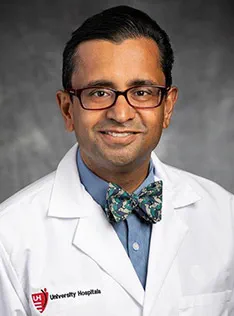University Hospitals Sleep Medicine Services Poised to Be a World-Class Sleep Center
November 09, 2021
Innovations in Pulmonology & Sleep Medicine | Fall 2021
New leadership leverages growing resources to build out interdisciplinary approach
University Hospitals Sleep Medicine Services is expanding under the new leadership of Susheel Patil, MD, PhD. Dr. Patil, who did his internal medicine residency at University Hospitals Cleveland Medical Center, has returned following his pulmonary, critical care and sleep medicine training at Johns Hopkins. He now serves as the Section Chief, Sleep Medicine, University Hospitals Cleveland Medical Center and Director, Sleep Medicine, University Hospitals Health System.
 Susheel Patil, MD, PhD
Susheel Patil, MD, PhD“I’ve been very interested in thinking about sleep health as an integral component of overall health,” Dr. Patil says. “I found this opportunity extremely interesting because University Hospitals was clearly thinking along the same lines and had placed the building blocks in place to build a top-tier sleep center.
“Sleep medicine is different from many branches of medicine. It’s highly interdisciplinary. We bring together medical experts spanning the field, from generalists — such as internists, pediatricians and family medicine that specialize in sleep medicine ‑ to neurologists, mental health experts, pulmonologists, otolaryngologists, dentists and anesthesiologists.”
System Changes Well Under Way
Ultimately, Dr. Patil says, the goal is to help primary care physicians get their patients to a sleep provider who can deliver high-value care and addresses each patient’s individual needs. This requires a coordinated effort. University Hospitals is investing in infrastructure to improve the quality of sleep services.
Accreditation. University Hospitals Health System has obtained corporate accreditation from the American Academy of Sleep Medicine (AASM), the body that accredits most U.S. sleep centers. “Instead of accrediting each University Hospitals location individually, the AASM has accredited University Hospitals Health System as one unit,” Dr. Patil says. “This standardizes care across the health system with common policies and procedures.”
Staffing. A new sleep system administrator oversees operations and promotes high-value care.
Governance. The newly implemented governance structure includes medical directors from across the University Hospitals system to promote standardized practices for sleep testing, and an executive committee to help improve other aspects of sleep-related clinical care. “By centralizing sleep care and our governing approach, individual sleep medicine practices can come together to improve the sleep health of the population we serve,” Dr. Patil says.
Testing. University Hospitals is installing a single sleep testing platform at all sleep centers to improve operational efficiencies, simplify the implementation of policies and procedures for technical staff and facilitate interpretation of sleep studies, all of which improve the quality of the sleep care provided.
Planned Sleep Programs and Collaborations
University Hospitals is exploring innovative models for integrating sleep healthcare for adults and children whose sleep may be affected by underlying medical problems, or whose medical problems can be exacerbated by sleep issues. Heart disease and diabetes are just two examples.
“We’re leveraging clinical care to provide access to ongoing clinical trials for sleep disorders, such as sleep apnea, insomnia and narcolepsy,” Dr. Patil says.
Unfortunately, many sleep disorders go undiagnosed, especially sleep apnea.
“Since sleep apnea is very common in patients admitted to the hospital, this represents a unique opportunity to identify at-risk patients,” Dr. Patil says. “We’re evaluating a potential pilot program to perform inpatient consultations for sleep apnea and, if appropriate, to connect patients with sleep medicine providers after discharge from the hospital.”
Where possible, University Hospitals Sleep Medicine Services will collaborate with other specialty areas within University Hospitals where sleep disorders are common, including cardiology and neurology, to help patients who have had a stroke or have heart issues. And because men and women often have different related sleep issues, requiring a customized approach to care, University Hospitals Sleep Medicine Services is developing sleep health programs for patients in University Hospitals Women’s Health and Cutler Center for Men.
Sleep Medicine Is a Fast-Growing Field
Although there were a record number of new sleep medicine fellows nationally in 2021, there are still not enough trained practitioners to meet the needs of patients. As a result, University Hospitals is expanding its sleep workforce to help meet the demand.
“In addition to hiring sleep specialist physicians, we’re hiring advanced practice providers (APPs) to further complement our workforce,” Dr. Patil says. “Sleep medicine is a relatively new field for APPs, so our physicians and more experienced APPs help train new APPs to provide high-value sleep care.”
University Hospitals is identifying primary care providers with a strong interest in sleep medicine who can serve as local champions in delivering sleep care with support from the sleep medicine team.
“The idea is that we provide some essential training and resources to make you comfortable caring for patients’ basic sleep issues,” Dr. Patil says. “If a patient’s needs are more complicated, then you can refer them to a University Hospitals sleep specialist.”
Dr. Patil says he is fascinated by the field of sleep medicine.
“If we can improve patients’ sleep health, we can improve their overall health, including lowering their risk for cardiovascular and metabolic conditions. The recommendations sleep specialists make to improve sleep health can significantly improve a person’s quality of life and function, so it’s profoundly gratifying.”
For more information about University Hospitals Sleep Medicine Services, call Dr. Patil at 216-844-3201.
Contributing Expert:
Susheel Patil, MD, PhD
Section Chief, Sleep Medicine
University Hospitals Cleveland Medical Center
Director, Sleep Medicine
University Hospitals Health System
Clinical Associate Professor of Medicine
Case Western Reserve University School of Medicine


